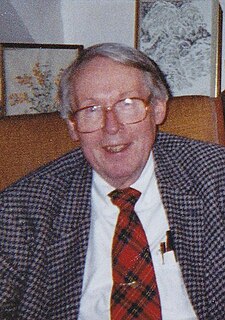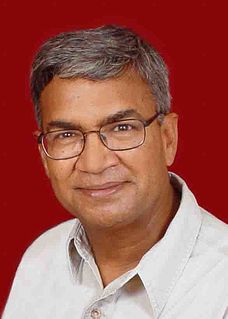Related Research Articles
Truth is the property of being in accord with fact or reality. In everyday language, truth is typically ascribed to things that aim to represent reality or otherwise correspond to it, such as beliefs, propositions, and declarative sentences.

Willard Van Orman Quine was an American philosopher and logician in the analytic tradition, recognized as "one of the most influential philosophers of the twentieth century". From 1930 until his death 70 years later, Quine was continually affiliated with Harvard University in one way or another, first as a student, then as a professor. He filled the Edgar Pierce Chair of Philosophy at Harvard from 1956 to 1978.

Rudolf Carnap was a German-language philosopher who was active in Europe before 1935 and in the United States thereafter. He was a major member of the Vienna Circle and an advocate of logical positivism. He is considered "one of the giants among twentieth-century philosophers."

Alfred Tarski, born Alfred Teitelbaum, was a Polish-American logician and mathematician. A prolific author best known for his work on model theory, metamathematics, and algebraic logic, he also contributed to abstract algebra, topology, geometry, measure theory, mathematical logic, set theory, and analytic philosophy.
In philosophical epistemology, there are two types of coherentism: the coherence theory of truth; and the coherence theory of justification.
In philosophy and logic, a deflationary theory of truth is one of a family of theories that all have in common the claim that assertions of predicate truth of a statement do not attribute a property called "truth" to such a statement.
Laurence BonJour is an American philosopher and Emeritus of Philosophy at the University of Washington.

Kaarlo Jaakko Juhani Hintikka was a Finnish philosopher and logician.
The following outline is provided as an overview of and topical guide to philosophy:
Broadly speaking, fallibilism is the philosophical claim that no belief can have justification which guarantees the truth of the belief, or that no beliefs are certain. Not all fallibilists believe that fallibilism extends to all domains of knowledge; common candidates for infallible beliefs include those that can be known a priori and self-knowledge.
Verificationism, also known as the verification principle or the verifiability criterion of meaning, is the philosophical doctrine which maintains that only statements that are empirically verifiable are cognitively meaningful, or else they are truths of logic (tautologies).

John W. Etchemendy is an American logician and philosopher who served as Stanford University's twelfth Provost. He succeeded John L. Hennessy to the post on September 1, 2000 and stepped down on January 31, 2017.
The following outline is provided as an overview of and topical guide to epistemology:

Jan Hertrich-Woleński is a Polish philosopher specializing in the history of the Lwów–Warsaw school of logic and in analytic philosophy.
Epistemology or theory of knowledge is the branch of philosophy concerned with the nature and scope (limitations) of knowledge. It addresses the questions "What is knowledge?", "How is knowledge acquired?", "What do people know?", "How do we know what we know?", and "Why do we know what we know?". Much of the debate in this field has focused on analyzing the nature of knowledge and how it relates to similar notions such as truth, belief, and justification. It also deals with the means of production of knowledge, as well as skepticism about different knowledge claims.
Following the developments in the philosophical study of formal logic with symbolic logic in the late nineteenth century and mathematical logic in the twentieth, topics traditionally treated by logic not being part of formal logic have tended to be termed either philosophy of logic or philosophical logic if no longer simply logic.
This is an index of articles in philosophy of language
Logical consequence is a fundamental concept in logic, which describes the relationship between statements that hold true when one statement logically follows from one or more statements. A valid logical argument is one in which the conclusion is entailed by the premises, because the conclusion is the consequence of the premises. The philosophical analysis of logical consequence involves the questions: In what sense does a conclusion follow from its premises? and What does it mean for a conclusion to be a consequence of premises? All of philosophical logic is meant to provide accounts of the nature of logical consequence and the nature of logical truth.

Anil K. Gupta is an Indian-American philosopher who works primarily in logic, epistemology, philosophy of language, and metaphysics. Gupta is the Alan Ross Anderson Distinguished Professor of Philosophy at the University of Pittsburgh. He is also a Fellow of the American Academy of Arts and Sciences. His most recent book, Conscious Experience: A Logical Inquiry, was published by Harvard University Press in 2019.
References
- 1 2 CV
- ↑ "Synthese".
- ↑ Sher, Gila (January 23, 2019). "Curriculum Vitae" (PDF).
- 1 2 Sher, Gila. (1991), The Bounds of Logic, Cambridge, MA: MIT Press.
- ↑ Sher, Gila. (2004), In Search of a Substantive Theory of Truth, The Journal of Philosophy
- ↑ Sher, Gila. (1996), Did Tarski Commit Tarski's Fallacy?, The Journal of Symbolic Logic 61, 653-86.
- ↑ Sher, Gila. (1999), Is There a Place for Philosophy in Quine's Theory?, The Journal of Philosophy 96, 491-524.